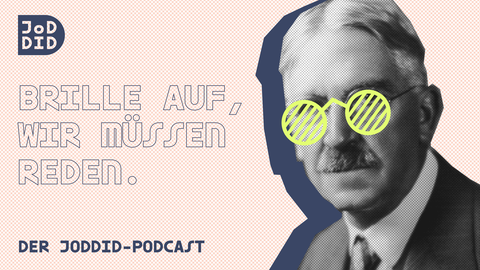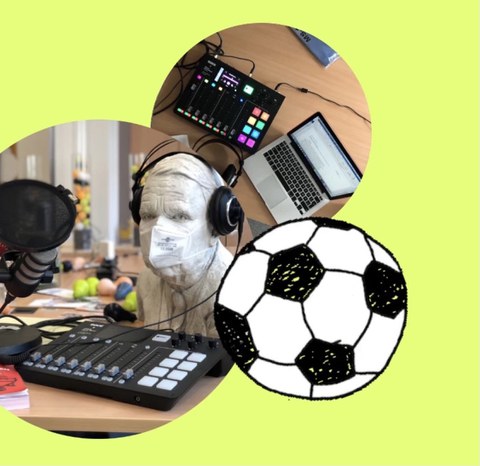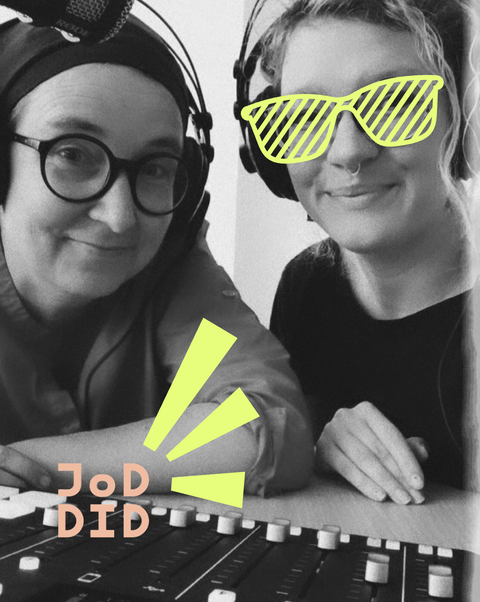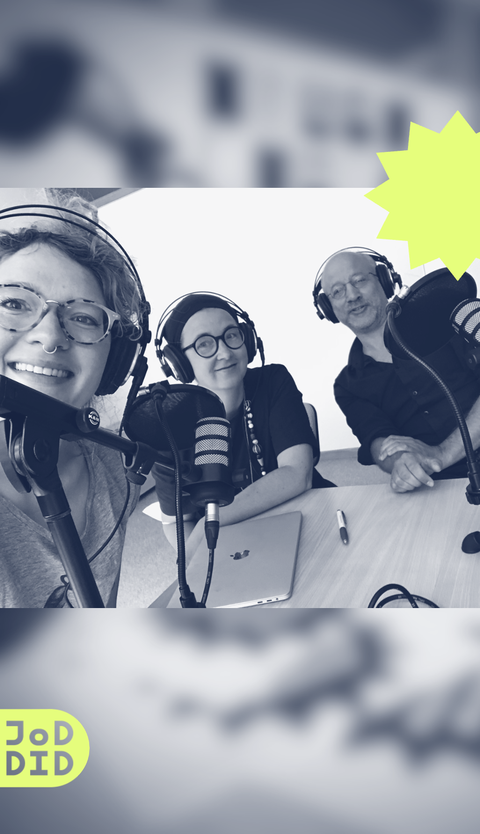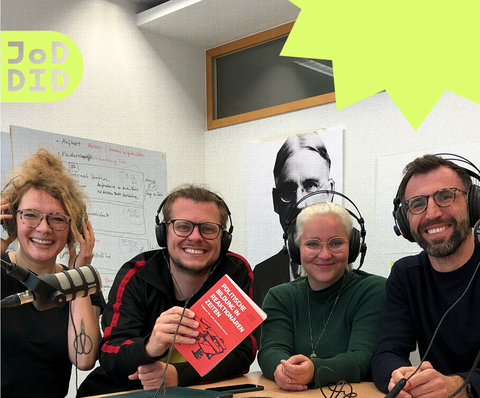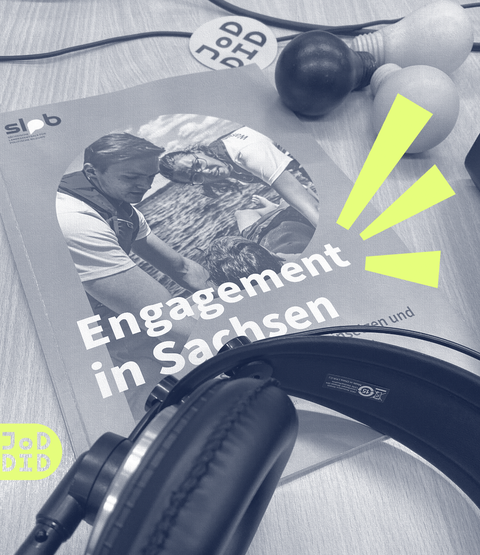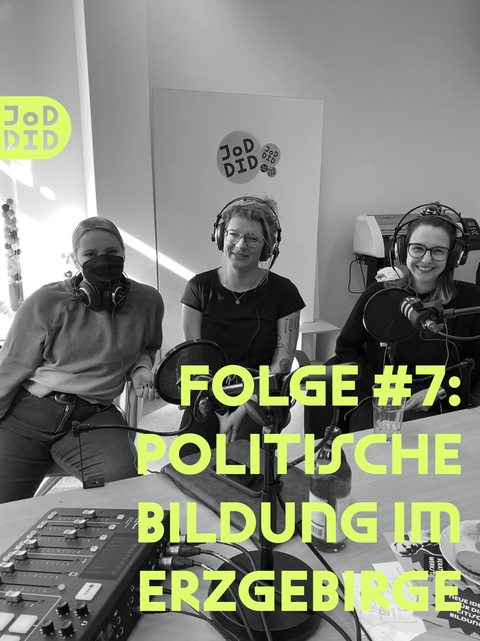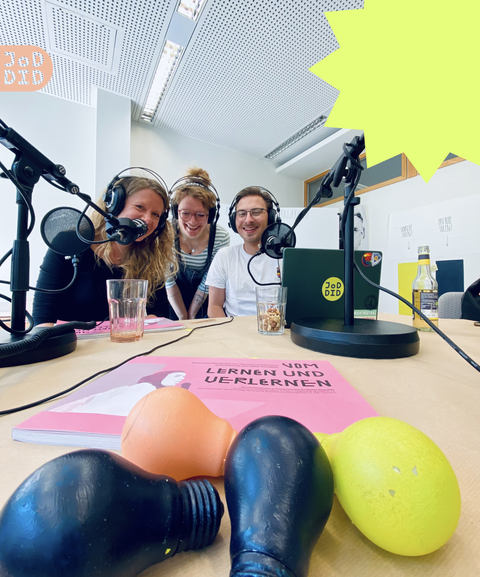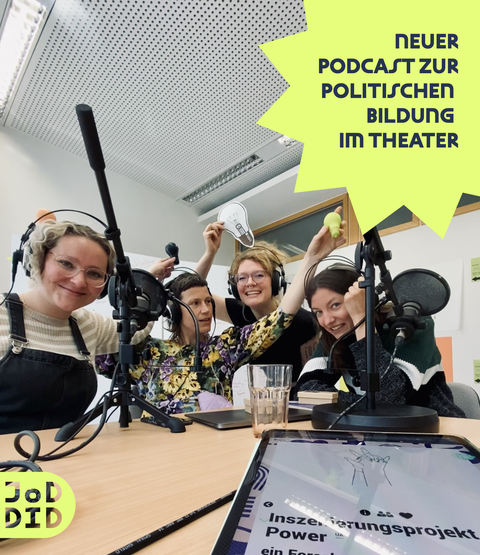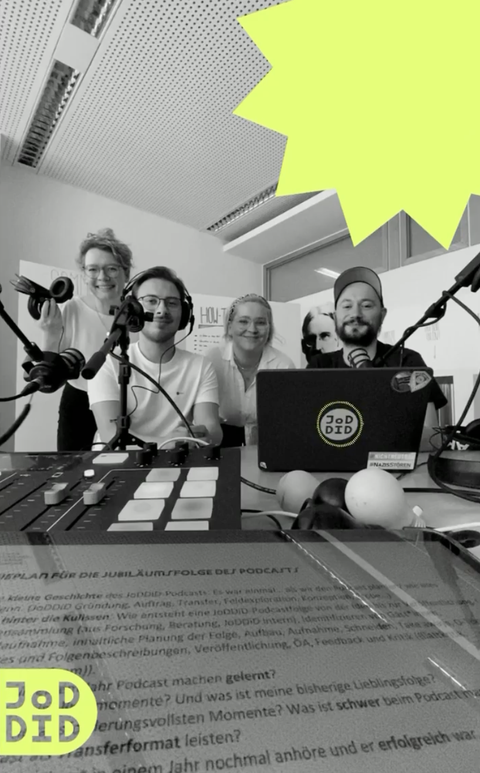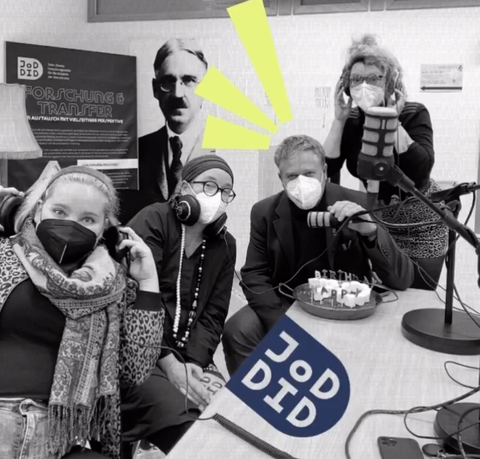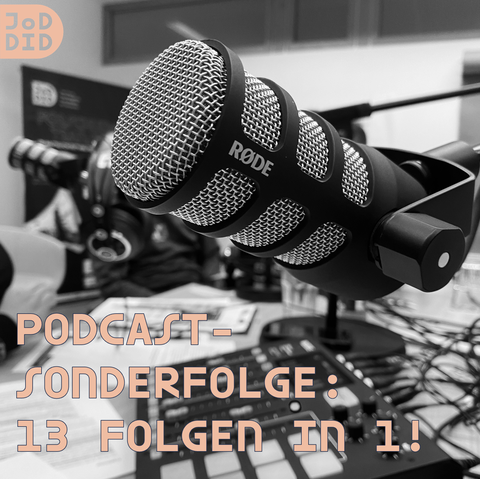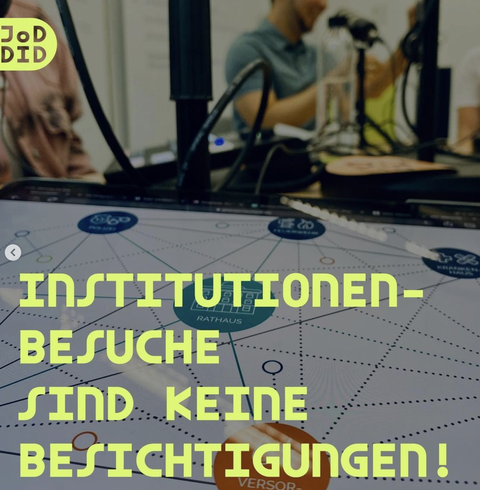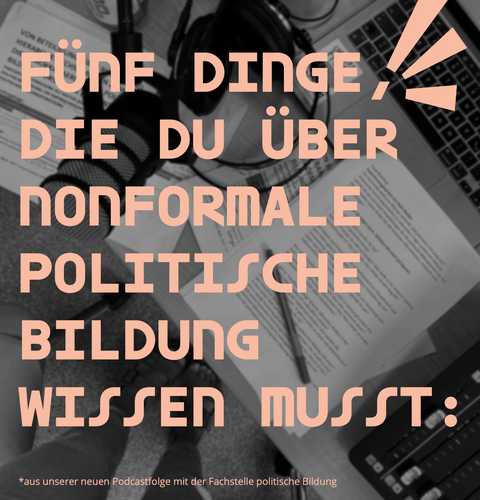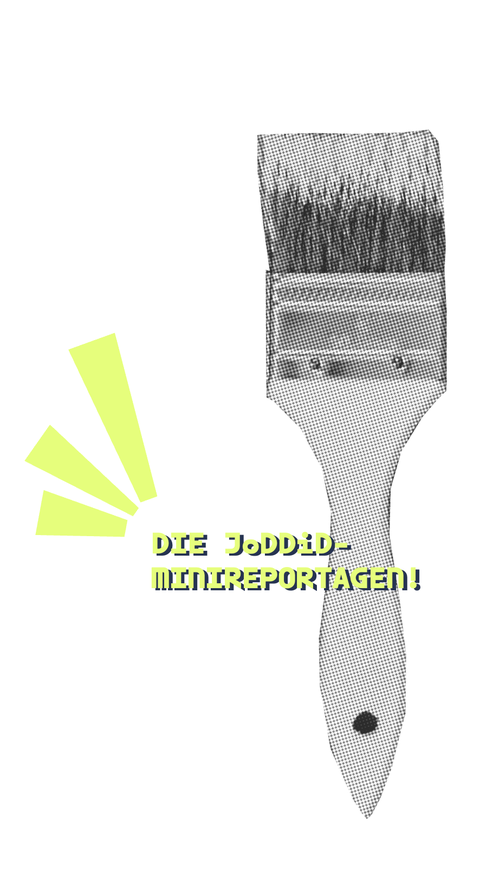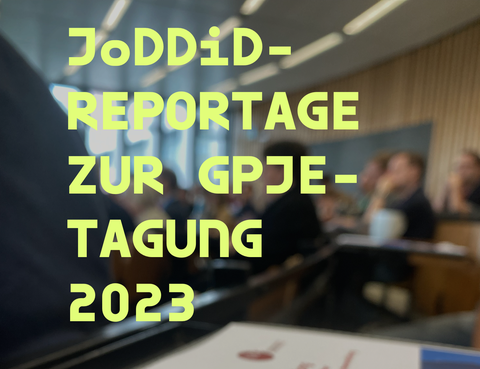The JoDDiD podcast
WHY A PODCAST?
A new study has been published. You discovered it (by chance)? Very good. Okay, now it's just a matter of reading the often several hundred pages and then identifying exactly the parts that are relevant to you and then also classifying the new findings and possibly discussing them with colleagues. Not without difficulty. This can easily take up a 40-hour week. Since we know that many people working in extracurricular education hardly have this time to work through the sometimes complex and difficult-to-understand scientific texts, the JoDDiD podcast is here to stay. After all, this is exactly where we set out to start: In the communication between science and practice. And we want to achieve a transfer that involves both sides. In other words, this format will present studies, concepts and theories, as well as exciting practical reports and case studies.
WHAT WILL IT BE ABOUT?
What will be the central theme? In our specific case, it is not a thread,
but a pair of glasses. The JoDDiD glasses. In this podcast discussion format, employees from the JoDDiD team put on the political didactic glasses and ask questions to the expert in the discussion. This format is not only about presenting, but above all about discussing and thinking (further) together! The aim is to formulate findings, assignments and questions for the field of political youth and adult education.
WHO ARE YOU LISTENING TO IN THE PODCAST?
Two people are planned as standard in the podcast, always including at least one JoDDiD person (with a political didactic perspective). The guests can be very diverse: Academics, practitioners, funding bodies.
AND WHERE CAN I FIND THE PODCAST?
The JoDDiD podcast can be found on all common podcast platforms with the search term "JoDDiD podcast" or directly here on our podcast media library:
_______________________________________________________________________________________________________
ALL PODCAST EPISODES AT A GLANCE
Teaser:
Listen in to find out what it's about.
Episode 1: Political education in the stadium
A discussion by JoDDiD about the study on "Stadiums as a place of learning" along the lines of special places, bonding, exclusion, topics close to the real world, much more and of course always against the background of (extracurricular) political education. But just listen for yourself and give us your feedback.
Episode 1 - Political education in the stadium
Episode 2: Civic education in the 16th Children and Youth Report
In this JoDDiD podcast episode, we talk to one of the 14 experts and co-author of the 16th Children and Youth Report, Prof. Anja Besand. Backgrounds, anecdotes, politically educational consequences and insights into the more than 600-page work are provided in this conversation for stakeholders in extracurricular civic education.
Episode 2 on the 16th Children and Youth Report
Episode 3: The end of the simulation
Our 3rd JoDDiD PODCAST episode is online. In this JoDDiD podcast episode, Dr. Götz Nordbruch from ufuq.de joined us at JoDDiD with a practical experience and concrete problem description. This practical discussion focuses on the question of how racism-critical political education can currently succeed. Together with Götz Nordbruch, we talk and think out loud about collateral learning, emotions in political education and the dilemma of inclusion, among other things.
A podcast episode in cooperation with ufuq.de.
Episode 3 - The end of simulation
Episode 4: Political education in reactionary times
In this new JoDDiD podcast episode, Elisa Moser & Tina Hölzel from JoDDiD had the exclusive opportunity to talk to two authors of the book "Politische Bildung in reaktionären Zeiten" (Wochenschauverlag 2021) about the challenges of group-focused misanthropy for political education. Prof. Dr. Rico Behrens & Stefan Breuer provide background insights into the case descriptions & central concepts & ideas of the work.
Episode 4 - Political education in reactionary times
Episode 5: Political education in the face of war
Now online as an audio recording - our digital discussion round from 28.02.2022 with many exciting guests, questions and impressions about the challenging topic of war.
Among others were:
Özcan Karadeniz (Association of bi-national families and partnerships Leipzig e.V.)
Norbert Hanisch (Kinder- und Jugendring Sachsen e.V. [KJRS])
Heidi Bischof (Network for Democratic Culture e.V. [NDK])
Anja Besand (JoDDiD)
Episode 5 (JoDDiD special)- Political education in the face of war
Episode 6: Civil society engagement in Saxony
Volunteering in Saxony?! From soccer clubs to election workers - how is the landscape of volunteers in Saxony structured and what does this mean for political education?
Today, as part of the new JoDDiD PODCASTFOLGE, we're talking to Friedemann Brause, Advisor at the Saxon State Center for Political Education(@slpb_dd ). At the beginning of 2021, the SLpB published its study "Engagement in Saxony - What people are committed to and what framework it needs". As always, the episode can be listened to via all the usual podcast platforms, our homepage or via this link.
Episode 6 - Civic engagement in Saxony
Episode 7: Political education in the Ore Mountains
JoDDiD PODCASTFOLGE #7: Political education in the Ore Mountains In this practical discussion, we talk to Alina Gündel from Agenda Alternativ e.V. in the Ore Mountains about political education in rural areas. Based on more than 10 years of practical political education work, we will learn about the potential and challenges in the Ore Mountains, how structures and administration work, which local stakeholders are active and how political education in the Ore Mountains can be conceived and implemented in terms of both topic and format. As always, you can find this and other JoDDiD PODCAST episodes via all the usual podcast platforms, our homepage or this link: Episode 7- Political education in the Ore Mountains
DOUBLE SEQUENCE 8.1 AND 8.2. political education and the NSU complex & political education in the documentation center on the NSU complex
This double episode of the JoDDiD podcast is about political education in Saxony and the NSU complex. Tina Hölzel and Paul Hübler from JoDDiD talk to Hannah Zimmermann from the Offener Prozess project. In the first part of our conversation, we will focus on the relationship between political education and the NSU complex in Saxony. We talk about the struggle to come to terms with the past and the concept of unlearning in political education, ask ourselves what remembrance should look like and try to outline the challenge for political education in Saxony. In the second part of our podcast with Hannah Zimmermann, we take a look at the planning processes for the documentation center on the NSU complex. We gain an insight into a process with many questions that still need to be discussed. What should a documentation center do? What are the wishes of the victims' relatives? How is the planning process structured? Should the documentation center be located centrally or decentrally? How do we present the fact that the authorities have destroyed important documents on the NSU complex or are not making them accessible? At the end, Hannah tells us what the documentation center looks like in her dreams. We're up for it!
Episode 8.1: Political education and the NSU complex
Episode 8.2: Political education in the documentation center on the NSU complex
Episode 9: Political education in the theater
In this exciting conversation, we talk to Nicole Dietz and Andra Born from the TJG about the Theaterakademie's "POWER" production project. Based on the experience of this theatrical work on "power structures and gang formation" with young girls, we reflect on political education in the theater, ask about common themes, moments that political education can learn from cultural education and explain what a riot and a rolling pin have to do with this political education project at the TJG.
Episode 9: Political education in the theater
Episode 10: Political education in the podcast
It's crazy how time flies - the JoDDiD podcast "Brille auf wir müssen reden." has been around for a year now. We took this as an opportunity to look back together in our small audio team "JoDDiD auf's Ohr", to compile unpublished material, to give you insights into the birth of the JoDDiD podcast, to indulge in experiences and memories together and also to report on challenging moments. Perhaps you would also like to make a podcast in the field of political education? You want to get to know the people behind the JoDDiD podcast in a completely different way or listen to unpublished outtakes - then this episode could be particularly exciting for you!
Episode 10: Political education in the podcast
Episode 11: Political education in Saxony discussed with the BpB
In this episode of the JoDDiD podcast, Tina Hölzel, Elisa Moser and Prof. Anja Besand talk to Daniel Kraft. Daniel Kraft is Head of Communications and Press Officer at the Federal Agency for Civic Education. To mark the 70th anniversary of the BpB, he and his colleagues are touring Germany with the BpB Infomobile. Dresden and the JoDDiD are the first stop on the tour, so we took advantage of the situation to record a podcast. We discuss political education in Saxony and East Germany with Daniel Kraft. We explore the question of what can be learned from an old hand like the BpB, what challenges the field is facing and think together about the transfer and communication work of political education.
Episode 11: Political education in Saxony discusses with the BpB
Episode 12: Political education needs takeaways!
The year is drawing to a close. In the last episode of the JoDDiD podcast for 2022, Anton and Paul summarize takeaways from all episodes for you in one episode. This gives you a dense summary of all the podcast episodes we've recorded so far. So have fun listening to our first year in review! We have set chapter markers for better orientation. This means you can skip between the takeaways or find the topics that are particularly interesting for your work. We thank you for your loyal listening, wish you a relaxing holiday season and look forward to a new podcast year in 2023 with new exciting topics and guests.
Episode 12: Political education needs takeaways
Episode 13: Political education at institutions
Political learning at institutions - from the police to the garbage collection and the court to the state parliament - a practical discussion with Franz Werner and Rico Lewerenz.
In this new JoDDiD podcast episode, we talk to two practitioners about a classic form of political education: learning at institutions.
We take a critical look, but also look at the potential of on-site learning.
Episode 13: Civic education in institutions
Episode 14: Civic education as a non-formal offer
In this new podcast episode, we had the particularly exciting opportunity to talk to the highly experienced Dr. Helle Becker from the Fachstelle politische Bildung. Not only does she have an incredibly broad expertise in the field of extracurricular civic education, she also provides a very well-informed overview of the Fachstelle and the entire field of extracurricular and non-formal civic education in Germany. But just listen for yourself.
Episode 14: Civic education as a non-formal offer
Episode 15: JoDDiD mini-report on the ECR conference in Bocholt
We attended the conference of the Society for Political Didactics and Political Youth and Adult Education (GPJE for short) on the topic of "Non-formal political education - science and practice"!
This was the best opportunity for us to try out a new format - the JoDDiD mini-reports. The idea behind them is to take you along to a wide variety of events in different situations so that you can gain an insight into the practice and science of political education.
SEQUEL 15: Mini-reportage ECR conference GPJE Bocholt
Episode 16: Civic education on the road - mini report on the GPJE conference "Emotions and civic education" in Hildesheim
We were at the Early Career Researcher Conference and the main conference of the Society for Political Didactics and Political Youth and Adult Education (GPJE for short) on the topic of "Emotions and Political Education" at the University of Hildesheim!
We attended the GPJE main conference 2023 in Hildesheim, which dealt with the topic of "Emotions and political education", a highly topical and central issue for political education.
Episode 16: Political education on the road - mini-reportage GPJE Hildesheim
Episode 17: Political education in Saxony
JoDDiD conducted an online survey among those active in the field of extracurricular civic education in Saxony in order to find out more about their current challenges and wishes, as well as their biographical backgrounds, prerequisites and understanding of their work. The results were published in the form of a field exploration and a strategy paper.
In this podcast episode, we talk to two authors, David Jugel and Rico Lewerenz, from the JoDDiD research department about the key findings of the field exploration.
Click here for the exploration study: https: //tu-dresden.de/gsw/phil/powi/joddid/forschung-transfer/forschung-1/wie-gehts-der-ausserschulischen-politischen-bildung-in-sachsen
If you would like to find out more, why not take a look at the press conference on the study on our JoDDiD YouTube channel: https: //www.youtube.com/watch?v=5s7uW3utzSc&t=21s
FOLLOW-UP 17: https://joddid-podcast.podigee.io/18-new-episode
Episode 18: Civic education and education for sustainable development
In this podcast episode, we talk to Anna-Maria Kümritz and René Michalsky from Trafo e.V.
We talk about education for sustainable development, which is currently on everyone's lips and very popular as an approach. What is ESD actually? How does the ESD approach relate to political education? How does ESD work? What similarities and differences can be identified with civic education? And what does ESD actually have to do with educational work in companies?
SECTION 18: https://joddid-podcast.podigee.io/19-new-episode
Episode 19: Civic education and elections
This podcast episode deals with a classic topic in civic education: elections.
In 2024, state elections will be held in many eastern German states. In Saxony, political educators are even facing a super election year with three elections. In this episode, you can find out what exactly political education has to do with elections, what the goals are, what suitable formats might be and what fears and concerns political educators have when dealing with the topic.
Our guests were Johanna Probst from the Political Children's and Youth Ring Saxony, Sabine Kirst from the Saxon State Center for Political Education and Franz Werner from Aktion Zivilcourage.
EPISODE 19: https://joddid-podcast.podigee.io/20-new-episode

